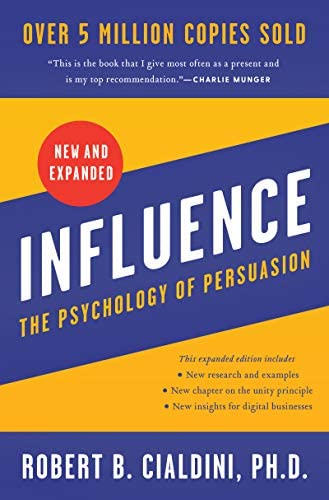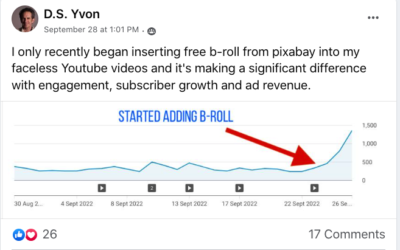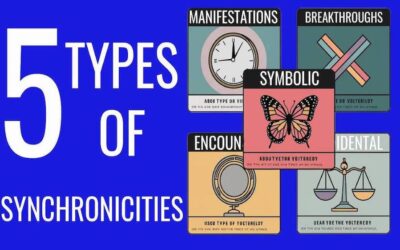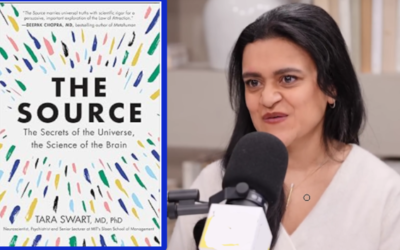In this post, we'll explore the key principles of persuasion and how you can apply them to become a more effective communicator, negotiator, and leader. And these principles are also handy so that you can recognize when they are potentially being used on you.
So whether you're looking to influence your boss, your partner, or your customers, or wanting to understand the psychology of persuasion, these principles can help give you an insight to how they work.
Let's go!
What is Persuasion?
Persuasion is the act of influencing someone's attitudes, beliefs, or behaviors through reasoning, argument, or appeal to their emotions. It's a fundamental part of human interaction and a key skill for success in many areas of life.
But persuasion isn't just about getting your way. It's also about understanding others and finding common ground. The most effective persuaders are those who can see things from the other person's perspective and tailor their approach accordingly.
The Six Principles of Persuasion
Now, let's take a look at six key principles of persuasion, as identified by social psychologist Dr. Robert Cialdini in his book "Influence: The Psychology of Persuasion."
The six principles mentioned here are reciprocity, scarcity, authority, consistency, liking, and social proof.
So let's gloss over these and then give examples:
1. Reciprocity:
The principle of reciprocity states that people feel obligated to return a favor or repay a debt. If you do something nice for someone, they'll feel compelled to do something nice for you in return.
For example, if you give someone a small gift, they'll be more likely to say yes when you ask them for a favor. Or if you offer a free sample of your product, people will be more inclined to make a purchase.
2. Scarcity
People place a higher value on things that are scarce or in limited supply. The fear of missing out on a unique opportunity or a one-time deal can be a powerful motivator.
Marketers often use scarcity tactics like "limited time offers" or "limited quantities available" to create a sense of urgency and drive sales.
3. Authority
People are more likely to be persuaded by someone who is perceived as an expert or authority figure. We tend to trust and defer to those who have knowledge, experience, or a position of power.
Advertisers often use celebrity endorsements or expert testimonials to lend credibility to their products. Politicians and leaders can use their authority to sway public opinion on important issues
4. Consistency
People have a strong desire to be consistent with their past actions and commitments. Once we've made a decision or taken a stand, we're more likely to stick with it.
Persuaders can use this principle by getting people to make small commitments first, which can then lead to larger ones. For example, a salesperson might get you to agree to a free consultation before trying to sell you a product.
5. Liking
We're more likely to be persuaded by people we like. Factors like physical attractiveness, similarity, and compliments can all increase our liking for someone.
Persuaders can use this principle by building rapport and finding common ground with their audience. They might also use humor, flattery, or shared experiences to create a sense of connection.
6. Social Proof
People often look to the behavior of others to guide their own actions. We're more likely to do something if we see others doing it, especially if they're similar to us or in a position of authority.
Marketers use social proof tactics like customer testimonials, user reviews, and social media shares to convince people to buy their products. Politicians might use crowd size or endorsements from influential figures to demonstrate their popularity and electability.
Applying the Principles of Persuasion
Now that we've covered six principles of persuasion, let's talk about how you can apply them in your own life.
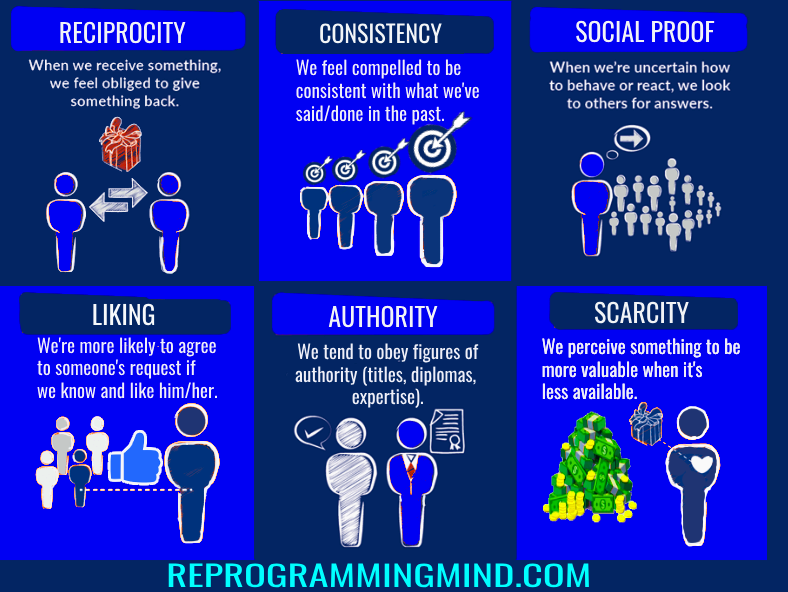
1. Reciprocity
To use the principle of reciprocity, look for opportunities to do small favors or give small gifts to the people you want to influence. This could be as simple as offering a compliment, sharing a useful piece of information, or doing a task without being asked.
When you do a favor, Dr Cialdini says to not expect anything in return. Just focus on being helpful and building goodwill. Over time, the other person will feel compelled to return the favor, making them more likely to say yes when you make a request.
For instance, the Disabled American Veterans organization reports that its simple mail appeal for donations produces a response rate of about 18%.
But when the mailing also includes a solicited gift (gummed individualized address labels,) the success rate nearly doubles to 35%.
Research done in fast food restaurants reveals the effectiveness of reciprocal tailoring.
Some patrons were warmly greeted and given a key chain.
They ordered 12% more than people not given a gift.
But a keychain has nothing to do with food. They came to eat, they're not here for a metal circle.
So what happens when you reciprocate in a way that is more closely tailored to their wants and desires?
Here's what happened when the gift was a small cup of yogurt.
The yogurt was the same value as the key ring, but this same value gift resulted in a 24% increase in food purchased!
Now let's take a look at another example and this comes from the company Amway. The company went from a basement run operation to doing $8.8 billion in annual sales and this is largely due to the reciprocity principle by way of the BUG. The BUG consists of several Amway products-furniture polish, detergent, shampoo, window cleaner, bug spray-carried to the customer's home. The Amway Career Manual then instructs the salesperson to leave the BUG with the customer 'for 24, 48 or 72 hours, at no cost or obligation to them.'
At the end of the trial period, the Amway rep is to return and pick up order for the products the customer wishes to purchase.
Since few customers use up the entire contents of even one of the product containers in such a short time, the salesperson may then take the remaining product portions in the BUG to the next potential customer and restart the process again.
Many customers yield to a sense of obligation to order products they have tried and Amway knows this is the case.
Here is a quote from a state distributor who shares their excitement in an Amway report.
'Unbelievable! We've never seen such excitement. Product is moving at an unbelievable rate, and we've only just begun...Local distrubutors took the BUGS, and we've had an unbelievable increase in sales (from Illinois distrubutor). The most fantastic retail idea we've ever had!'
So that shows the persuasive power of reciprocity, but what if you decline the apparent generosity?
For that, Cialdini writes about someone that refused favours from Reverend Jim Jones, the cult leader of Jonestown, Guyana. He had called for the mass suicide of all residents by means of drinking poison-laced Kool-Aid.
Diane Louie, a resident, decided to reject Jones's command and made her way out of Jonestown and into the jungle. She attributes her willingness to do so to her refusal to accept special favours from him when she was in need. She turned down his offer of special food while she was ill because 'I knew once he gave me those privileges, he'd have me. I didn't want to owe him nothin'."
Perhaps she learned this from Reverend Jones mistake by teaching her the Scriptures.
The Bible has a quote about this reciprocity principle in Exodus 23:8 "And thou shalt take no gift; for a gift blindeth them that have sight and perverteth the words of the righteous."
Other translations quote it as ' And you shall take no bribe, for a bribe blinds the clear-sighted and subverts the cause of those who are in the right. Do not accept a bribe, for a bribe blinds those who see and twists the words of the innocent.'
2. Scarcity
To create a sense of scarcity, emphasize the limited availability or time-sensitive nature of what you're offering. Use phrases like "limited quantities available" or "offer ends soon" to create a sense of urgency.
You can also create artificial scarcity by offering a product or service in limited batches or for a limited time. This can help build excitement and drive demand.
3. Authority
To leverage the principle of authority, position yourself or your organization as an expert in your field. Share your credentials, experience, and knowledge to establish credibility.
You can also use testimonials, endorsements, and awards to demonstrate your authority. Invite respected figures in your industry to speak at your events or write guest posts for your blog.
For this example let's look at a London bank.
These bankers received a request to provide such a donation in support of the bank's fundraising campaign for a couple charities (Help a Capital Child & Meningitis Research UK).
One set of bankers, in the control group, got the request in a standard letter asking for te financial commitment; it produced 5% compliance.
A second set got a visit from an admired celebrity who endorsed the program; this liking-based tactic bumped up compliance to 7%
A third sample encountered a reciprocity based appeal; upon entering the building, they were approached by a volunteer who first gave each a packet of sweets and then asked them to participate in the program, which boosted compliance to 11%.
A fourth group received an appeal that incorporated the principle of authority in the form of a letter from the CEO extolling the importance of their program to the bank as well as the value of the selected charities to society; it generated 12% compliance.
A final sample got a blend of the reciprocity and authority influence principles-the gift of sweets from a volunteer plus the CEO's personalized letter.
Compliance soared to 17%
4. Consistency
To encourage consistency, get people to make small commitments that align with your larger goal. For example, if you're trying to sell a product, start by getting people to sign up for a free trial or attend a webinar.
Once someone has made a small commitment, they'll be more likely to follow through with a larger one. They'll also be more receptive to your persuasive messages, as they'll want to maintain consistency with their previous actions.
1/ How are you doing today? or 'How are you feeling this evening?'
The caller's intent with this introduction is not merely to inquire about your well-being. It is to get you to respond-as you normally do to such polite, superficial inquiries-with a polite, superficial comment of your own: 'Just fine' or 'great thanks'.
Once you've publicly stated that all is well, it becomes much easier for the solicitor to corner you into aiding those for whom all is not well:
'I'm glad to hear that because I'm calling to ask if you'd be willing to make a donation to help the unfortunate victims of ...'
The theory behind the tactic is that people who have just asserted that they are doing/feeling fine - even as a routine part of a sociable exchange-will consequently find it awkward to appear stingy in the context of their own admittedly favorable circumstances.
This might seem a bit outrageous so consumer researcher Daniel Howard decided to put this theory to the test.
He phoned up the residents of Dallas, Texas and asked if they would agree to allow a representative of their Hunger Relief Committee to come to their homes to sell them cookies, the proceeds from which would be used to supply meals for the needy.
When tried alone, that request produced 18% agreement.
However, if the caller initially asked, "how are you feeling?' and waited for a reply before proceeding with the standard approach, several noteworthy events happened.
First, of the 120 people called, 108 gave the favorable reply ('good,' "fine" etc).
Second, 32% of the people who got the "how are feeling this evening?' question agreed to receive the cookie seller at their homes, which is nearly twice the success rate of the standard solicitation approach.
Third, true to the consistency principle, almost everyone (89%) who agreed to such a visit did in fact make a cookie purchase when contacted at home.
2/ Now here is another example on how to use this consistency principle for the purpose of curbing sexual infidelity. This is important because psychologists warn that cheating on a romantic partner is a source of great conflict, often leading to anger, pain, and termination of the relationship. They've located an activity to help prevent the occurrence of this destructive sequence: Prayer. But not prayer in the general sense but of a particular kind.
If one romantic partner agrees to say a brief prayer for the other's well-being every day, he or she becomes less likely to be unfaithful during the period of time while doing so. The reason being is that after all, such behaviour would be inconsistent with daily active commitments to the partner's welfare.
5. Liking
To increase liking, focus on building genuine connections with the people you want to influence. Find common ground, share personal stories, and show genuine interest in their lives and goals.
You can also use humor, compliments, and flattery to create a positive association. But be careful not to overdo it or come across as insincere.
For this example we can begin with the Guinness Book of World Records and find the world's greatest car salesman. This record belongs to Joe Girard. He won the title of "Number One Car Salesman" twelve years in a row. He averaged more than 5 cars and trucks sold every day he worked. The formula he used to sell the most vehicles had two ingredients. "Finding the salesman you like, plus the price. Put them both together, and you get a deal."
He also snail mails his prospects one a year with a card that says 'I Like You". Liking seems to make a big difference so give this video a like to help this segue into the last principle of persuasion.
6. Social Proof
To leverage social proof, highlight the success stories and testimonials of people who have used your product or service. Share user reviews, case studies, and social media mentions to demonstrate the value and popularity of what you're offering.
You can also use social proof to create a sense of FOMO (fear of missing out). Highlight the number of people who have already signed up for your email list or attended your events.
Here is an example of social proof at work in the sales of the McDonalds McFlurry.
When customers in one set of McDonalds were told "How about a dessert? The McFlurry is our visitors favourite," McFlurry sales jumped 55%.
After an order, if the clerk said, "The [x] flavour is our visitors favourite McFlurry topping," customers increased their extra topping purchases by an additional 48%.
Conclusion
In conclusion, the psychology of persuasion is a powerful tool for influencing others and achieving your goals or understanding how others are seeking to achieve their own. By understanding and applying the six key principles of reciprocity, scarcity, authority, consistency, liking, and social proof, you can become a more effective communicator and leader.
Remember, persuasion is about finding common ground, building trust, and creating winning situations. When you approach persuasion with authenticity and integrity, you'll be more likely to achieve lasting success.
So go forth and persuade! Use these principles to influence your boss, your partner, your customers, and anyone else you want to convince. And remember, practice makes perfect. The more you apply these principles, the more natural and effective they'll become.
The Compassionate Approach: How to Break Up With Someone Respectfully
Breaking...
Managing ADHD: Strategies for Improving Focus, Organization, and Productivity
Attention-De...
Tips for Improving Retention-Based Video Editing
Before...
Mastering Emotional Control: Strategies for Success
Emotional...
The Hidden Message in Synchronicities: 5 Different Types of Synchronicity
Have you...
How to Identify Your Highest Excitement
How to...
Unlocking Your Super Brain: Neuroplasticity and Neurogenesis Explained
Have you...
How Our Brains Turned Fools Woke – Dr. Iain McGilchrist
Here are...
The Source by Dr. Tara Swart Book Review Key Takeaways
Review of...
How to Cure PTSD Four Times in 5 Hours
This case...


